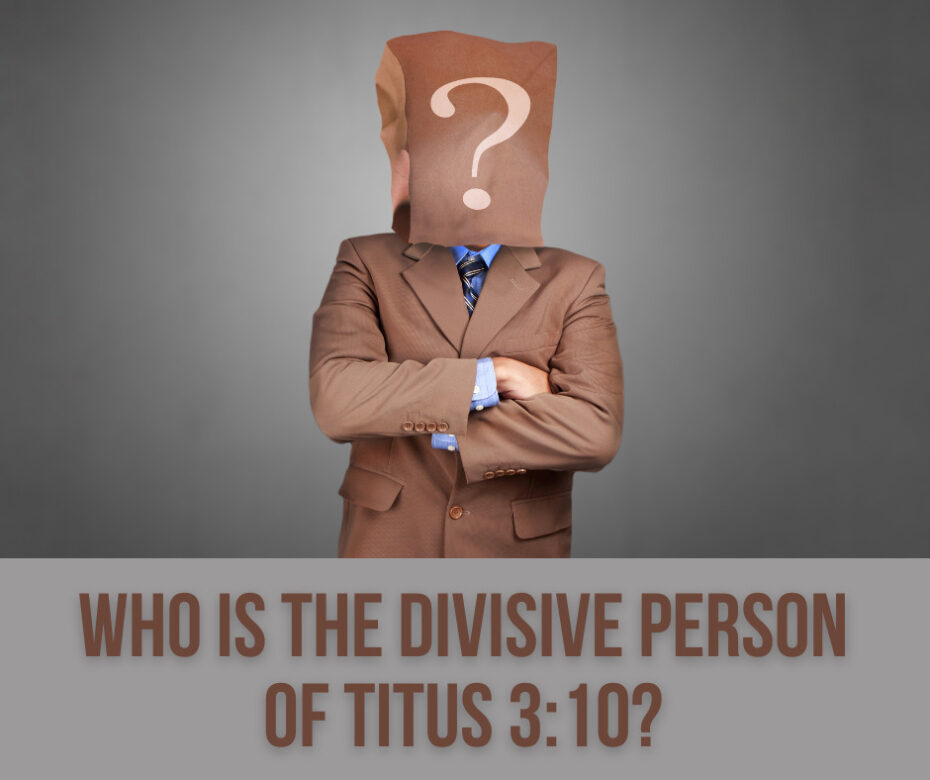LT writes,
Dear Bob,
When I have encountered serious doctrinal differences with someone’s Biblical teaching, I have raised this issue with others and not always directly with the teacher himself. I have been informed that not trying to resolve doctrinal differences with the teacher first is a violation of Matthew 18:15-17. Is that a correct application of Matthew 18:15-17? Thanks for your consideration.
Matt 18:15-17 concerns what to do when your brother sins against you. You are first to discuss it with him. If he does not listen, you should take one or two more people with you to talk about it. If he still doesn’t listen, then church discipline should take place.
LT’s question does not concern a brother who sins against him. His question concerns a doctrinal concern.
He does not explain the context of raising the doctrinal concern with others. This could be raising the issue with the elders of a local church, a campus director with Cru or the Navs, the Academic Dean at a seminary, or the principal of a Christian high school. Let’s discuss this in a few different contexts.
Say that LT is in an adult Sunday School class, and the teacher promotes Lordship Salvation. That would be appropriate if that is the doctrinal position of the church. But this church disagrees with Lordship Salvation and says so in its doctrinal statement. LT would not violate Matthew 18 by going directly to the elder board to raise his concern. The teacher did not sin against LT. The teacher was merely teaching the Bible as he understands it.
What if LT is a seminary student and hears a professor teach something contrary to the seminary’s doctrinal statement? He would be correct in going directly to the Academic Dean to discuss his concern. I’ve witnessed this multiple times at Dallas Theological Seminary. I once went to the Academic Dean with a doctrinal concern without first discussing the issue with the professor.
Finally, let’s say that LT is in an action group with Cru. His leader teaches something contrary to Cru’s doctrinal statement. He could go directly to the campus director to express his concern.
It is hard enough for someone to express their doctrinal concerns without us putting up some artificial hurdle that makes it harder. Whistleblowers should be rewarded, not rebuked.
A while back, I read a blog in which the writer complained about people who disagree with things he posted. He quoted Titus 3:10, “Reject a divisive man after the first and second admonition.” He was implying that those who complain are divisive people.
The divisive man Paul discussed in Titus 3:10 was himself teaching false doctrine.
The word translated divisive in Titus 3:10 is hairetikos. We get the word heretic from it. Towner says,
“The term hairetikos had not yet acquired the technical meaning ‘heretic’ (but see 2 Pet 2:1); nonetheless in this case, divisiveness is directly linked to errant teachings and practice. The phenomenon develops around an opinion (or set of them), belief or ideology (perhaps including praxis) that is held so firmly by a group that it separates from the larger community—thus the sense of factionalism or divisiveness” (The Letters to Timothy and Titus, pp. 796-97, emphases added).
We have no evidence that Paul went directly to the Judaizers before he told the Galatian believers that the Judaizers were proclaiming a false gospel (Gal 1:6-9).
In Antioch, Paul confronted Peter and Barnabas publicly (Gal 2:14-21). He did not first meet with them privately.
Paul was not the one being divisive. The Judaizers and even Peter and Barnabas (on one occasion) were being divisive.
If the blog writer is himself teaching false doctrine, then it is he who is the divisive man, not the one who brings the concern to his superior. Only if the person raising the concern is teaching false doctrine is he a divisive person.
I’ve had this happen to me on many occasions. People have complained directly to my board about things I have said and written. That is appropriate. If the doctrinal complaint is accurate, I should be called into account. I realize I could lose my job if my doctrinal error is sufficiently bad.
Because of Jas 3:1, I email my board some proposed blogs in advance. This is one such blog. The board members are there to help me. If I know what I am writing is potentially controversial, I want them to let me know whether they think this blog should be published. Over the past five years, I’ve probably scrapped twenty blogs I wrote because my board had a problem with the content or tone.
If you hear something that you think is doctrinally off, feel free to discuss it with an elder, the campus director, the Academic Dean, or the head of whatever parachurch ministry is in view.


